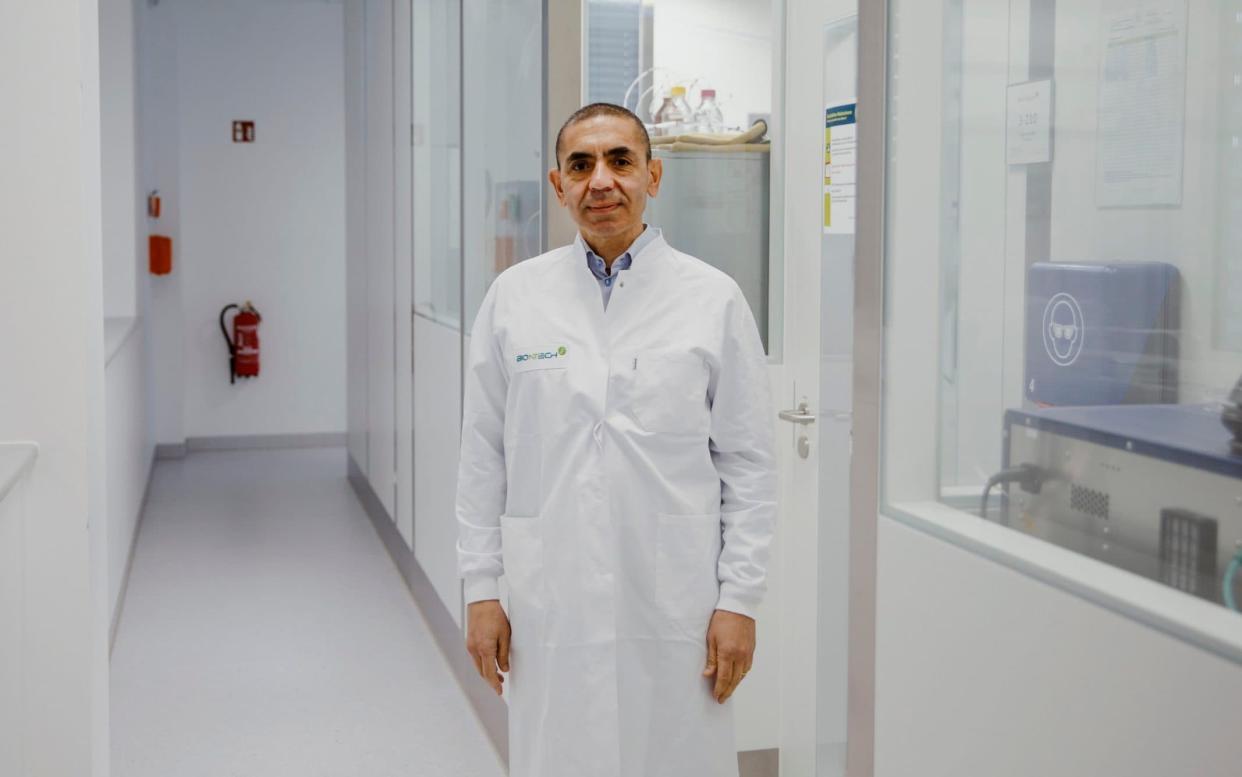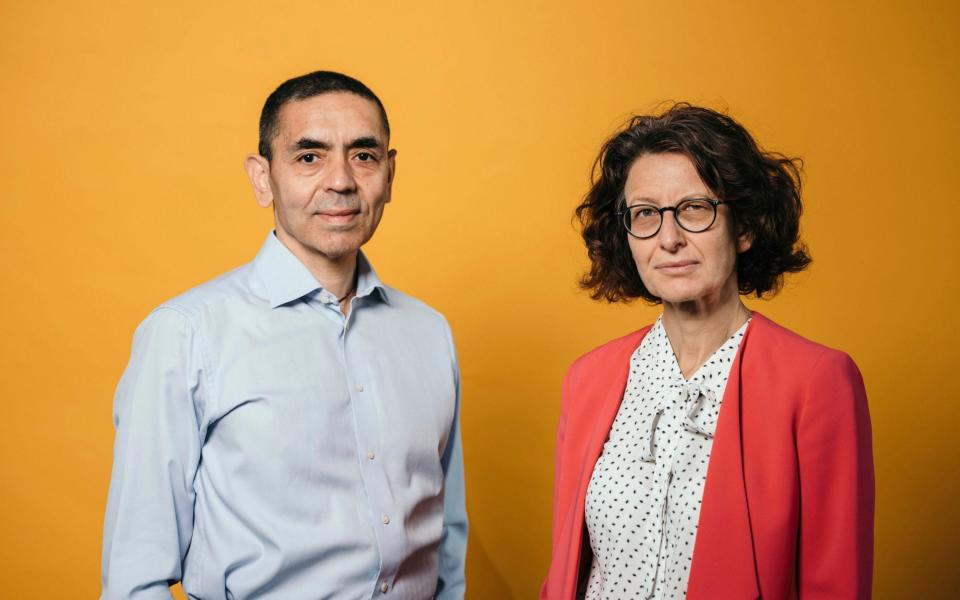Meet the modest man who is saving the world from Covid with the Pfizer vaccine

Archimedes had his bathtub, Isaac Newton an apple tree. For Dr Ugur Sahin and his wife Dr Ozlem Türeci, it was a breakfast table conversation about a mysterious virus spreading from the Chinese city of Wuhan that sparked one of the greatest scientific advances of the ages – hailed in some quarters as the most significant since Alexander Fleming’s discovery of penicillin in 1928.
This week, as Britain became the first country in the world to grant approval for the use of the Pfizer/BioNTech vaccine, which has been invented by the couple’s firm, Dr Sahin was at home in their modest apartment in Mainz, Germany, where he has worked for much of the coronavirus pandemic.
Next to his desk are a couple of pot plants and in the neighbouring room the spinning bike where he grinds out a few miles when he needs to clear his head. The occasional car drones along the street several floors below. Nobody looking up would guess this is the home of the couple who might have just saved the world.
Dr Sahin is quick to dismiss such accolades (he and his wife have also been described as the most celebrated marriage in science since Marie and Pierre Curie and tipped for a Nobel Prize). Instead, he stresses that the development of the vaccine was a collective endeavour by a team of scientists at BioNTech, the biotechnology company they founded in 2008 and which is now worth billions.
“Of course, this feels fantastic,” the 55-year-old grins as we speak via video call.
Now comes the hard part, well at least as far as the British Government is concerned. The vaccine poses a unique logistical challenge, in that it requires transportation at a temperature of -70C. This has led to ministers rowing back from early promises to distribute it first among care home residents and staff. But Dr Sahin insists that with proper planning there should be no difficulty.

“That should not be a challenge if everyone really understands the transportation conditions and if the logistical framework is built to deal with that,” he says, pointing out that once it has been transported in a deep freeze the vaccine is stable for five days, refrigerated between 2C and 8C.
“If it is needed in Britain, you can reach every place with a normal transportation vehicle within a few hours. This just needs to be organised. Since this is such a new and big operation the real challenge is sorting things out and coming up with a good solution.”
The Government’s flip-flopping over distribution to care homes centres, around how to split up packs of the vaccine – which arrive in doses of 975. When approval was granted on Wednesday, ministers initially said they were not yet able to circulate the jab among care homes due to concerns over separating and handling the vaccine. On Friday, though, officials changed tack and indicated they might have found a way after all and could soon start rolling the jab out.
To avoid further confusion, Dr Sahin is calling for the establishment of an expert group to “understand all the constraints” around the vaccine’s use.
“We will continue to support colleagues in the UK to ensure they don’t restrict themselves too much,” he says. “If you misunderstand certain requirements you might think this is not possible, even though there is a solution available.”
Britain has ordered 40 million doses of the Pfizer vaccine, enough to inoculate 20 million people with two doses, dispensed 21 days apart.
Chris Hopson, the chief executive of NHS Providers, this week warned that an initial 800,000 doses “could be the only batch we receive for some time”. While Dr Sahin will not be drawn on delivery dates citing confidentiality rules, he promises, “the UK will get a fair allocation of the dose we produce”.
Following that breakfast table chat with his wife, back in January, Dr Sahin set to work on his computer, designing the template for 10 possible coronavirus vaccines. The couple created a project nicknamed “Light Speed” and linked up with the US pharmaceutical company Pfizer.
It has taken just 10 months for the vaccine to be developed and granted emergency use authorisation – beating the previous Western record by more than three years. Dr Sahin credits its success to a “world-class research group” of scientists, many of whom have worked together for a decade or more.
At the most basic level, it works by instructing the body’s cells to produce certain proteins, which then create an antibody response. This mRNA (messenger RNA) technology was originally developed to fight cancer and Dr Sahin believes in the next 20 years we will see a revolution in how we tackle that disease.
He believes the answer lies in developing personalised treatments, which can target a specific tumour in a patient’s body. “I believe this type of individualisation could help us dramatically change the fate of cancer therapy,” he says.
First, though, there is the small matter of inoculating the world against Covid-19 – a monumental undertaking that is already testing international goodwill. There have been mutterings from the rest of Europe and the US that Britain somehow sped up its regulatory process in order to be the first country to have a vaccine approved for widespread use.
On Wednesday, Dr Anthony Fauci, the top US infectious diseases expert, told American news networks that the UK had not reviewed the vaccine “as carefully” as the US and had “rushed” the approval process – remarks for which he later apologised, saying: “I did not mean to imply any sloppiness even though it came out that way.”
The Medicines and Healthcare products Regulatory Agency (MHRA) – Britain’s medicines regulator – has insisted that, “No vaccine would be authorised for supply in the UK unless the expected standards of safety, quality and efficacy are met.”
Dr Sahin says he has “no concerns at all” with the speed at which the vaccine was signed off. Speaking of the process in the UK he says, “it is extremely professional and diligent work”.
“Everybody understands their responsibility and the authorities did a fantastic job.”
He expects their European and US counterparts to quickly follow suit. And over the next three months he hopes to see more approvals for other vaccines, including Moderna – of which Britain has ordered seven million doses – and the Oxford AstraZeneca vaccine, of which the UK has ordered 100m doses.
At present, he adds, Pfizer plans to manufacture 1.3 billion doses of their vaccine for 2021 and work is ongoing to increase that volume. He is, though, concerned at any suggestion of wealthy countries and companies seeking to jump the queue and is adamant theirs will be a vaccine for the world – a view which stands in stark contrast to the vainglorious vaccine nationalism trumpeted by Education Secretary Gavin Williamson, who has claimed the UK was first to grant approval because it is “a much better country” than anywhere else.
Diplomatic relations have also been strained by the interference of hackers, who have targeted various aspects of vaccine development. Russia has been accused by the security services of attempting to steal work at Oxford University and Imperial College London, while this week it emerged the “cold supply chain” that transports the Pfizer/BioNtech vaccine has also been targeted. The identity of the hackers is unclear but the sophistication of the attacks suggest a nation state.
Mindful of such risks, Dr Sahin says his IT team has been working with the German security services. “So far we have not encountered something limiting our work,” he says. “But, to be frank, if I don’t hear something it just means people [within his team] did their job.
The approval of the vaccine has also been met by a predictable backlash from the anti-vaxxer community, with various baseless theories circulating on social media. This week, government ministers summoned tech bosses to a virtual meeting demanding action, and Facebook has already promised to remove conspiracy theories from its platforms.
But Dr Sahin believes the tech firms must go further and redesign the algorithms which underpin much of social media to avoid mistruths being so readily shared. “This amplification of opinion is not healthy for our society,” he says. Famous faces choosing to take the vaccine publicly would, he believes, help counter the anti-vaxxer narrative.
I suggest the likes of the Queen and Sir David Attenborough, but he demurs. “It would be great if prominent people could do that – but of course I can’t request anyone.”
Dr Sahin was born in the Turkish coastal city of Iskenderun. His parents were factory workers and, when he was four, the family moved to Cologne as part of a programme to attract economic migrants to rebuild postwar Germany.
“Even as a kid I was interested in how things work," he says. "But it was not easy to get books. I had to go to the library to read.”
He studied medicine at Cologne University and after completing a PHD joined Saarland University Hospital where he met his wife, Dr Türeci, who also comes from a Turkish family settled in Germany.
Dr Sahin wears a Turkish amulet known as a nazar around his neck although prefers not to dwell on his own background. “I’m not proud about my story,” he says. “At the end of the day what drives us is our work. We are not self-focused. In our company we have people from more than 60 countries. We should not ask for the ethnic background of the person, but the quality of science and contribution... It is just a matter of random fact that I am an immigrant.”
The couple, who have a teenage daughter, quickly understood when they met 30 or so years ago that they shared a similar clarity of purpose. In an interview with a German newspaper, Dr Türeci said she and her husband began their wedding day in 2002 wearing lab coats and resumed their research after a brief dash to the registry office.
Dr Sahin describes himself as more of an ideas man while his wife provides an “extremely critical real-life check of what is possible”. Both are Muslim, and for a time his wife considered becoming a nun before choosing instead to focus on science – something for which we should all be glad.
The pair speak of a shared scientific curiosity and altruism. For Dr Sahin, the desire to develop pioneering treatments started while working as a junior doctor at the oncology department of Cologne Hospital. He noticed a discrepancy between the research work on new therapies he was doing in the laboratories and being forced to tell his dying patients that there was nothing more they could do for them. “I knew as a scientist this is not true,” he says.
The faces of some of those he couldn’t help haunt him today. “I sometimes remember my patients if I’m confronted with a certain type of disease,” he says. “I have a picture of the patient and the interaction, and this motivates me.”
In 2001, he and Dr Türeci co-founded Ganymed Pharmaceuticals – aimed at developing antibody treatments – which was sold for $1.4bn to Japan’s Astellas Pharma in 2016, enabling the pair to focus on mRNA research
In 2008, they established BioNTech on a street in Mainz named An der Goldgrube, which translates fittingly as “At the Goldmine”. Morgan Stanley estimates the vaccine could earn Pfizer and BioNTech around £10bn billion in revenue.
Dr Sahin says they have no personal interest in wealth, beyond being able to fund more research. The couple cycle everywhere and don’t own a car. Pre-pandemic holidays meant a rented apartment in the Canary Islands, with good internet access for the inevitable work they needed to do. “Money is a tool to enable us to address our mission,” he says. “It does not mean anything beyond that.”
Fairness, he adds, has been their motivation since the start of the pandemic, combined with a belief in the power of co-operation. “It is not only the idea of working together with two of us but working together with a scientific community,” he says. “This makes power.”
Read more of our coverage on the Pfizer vaccine
How the UK will get Pfizer's Covid vaccine from factory to patient
The priority list for the Pfizer vaccine and how it will be rolled out


